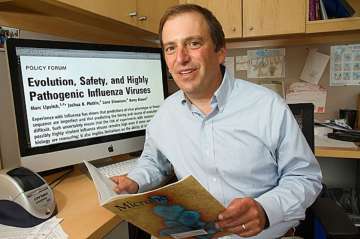The deadly novel coronavirus is more challenging than global health epidemics Ebola and MERS, Harvard Epidemiology professor Marc Lipsitch told India TV Digital. Marc Lipsitch is Professor of Epidemiology and Director of the Center for Communicable Disease Dynamics at the Harvard T.H. Chan School of Public Health. India TV Digital spoke to Lipsitch at length on the now declared pandemic -- Coronavirus. He is an author of more than 250 publications on antimicrobial resistance, epidemiological methods, mathematical modeling of infectious disease transmission, pathogen population genomics, and immunoepidemiology of Streptococcus pneumonia. Here are some excerpts from his interview.
CORONAVIRUS AND CONCERNS
The world saw global health epidemics Ebola, Sars, Mers etc. India too has seasonal epidemics including dengue, H1N1. Why is this particular virus -- COVID 19-- so potent to spread so widely?
This is a virus that is contagious at levels similar to pandemic flu, and thus more challenging than Ebola or MERS. SARS was also quite transmissible (maybe more than this virus) but was controllable with public health measures like isolation and quarantine. In this virus, the larger number of mild cases and some degree of presymptomatic transmission mean that those measures alone are not likely to work -- we need general approaches to reduce social contacts between people.
The World Health Organisation (WHO) describes Ebola virus disease (EVD) as a "rare but severe, often fatal illness in humans." The virus is transmitted to people from wild animals and spreads in the human population through human-to-human transmission. As per WHO, the average EVD case fatality rate is around 50 percent. Case fatality rates have varied from 25 percent to 90 percent. An ebola outbreak in the Democratic Republic of Congo was declared on August 1, 2018, the second such in the same decade and tenth ebola outbreak in the African republic of Congo. On July 17, 2019, WHO declared the outbreak as an international public health emergency. Even in 2020, the Ebola virus disease continues to affect Congo. The ongoing epidemic has 3,421 cases reported as on January 28, 2020, among which 3,302 are confirmed. Deaths among confirmed cases stand at 2,123 as of January 28. Two drugs are being tested for ebola virus treatment under a therapeutic trial named PALM.
MERS is an illness caused by a virus called Middle East Respiratory Syndrome Coronavirus (MERS-CoV). Most MERS patients developed severe respiratory illness with symptoms of fever, cough and shortness of breath, the Centers for Disease Control and Preventions says. MERS has killed around 34 percent of the roughly 2,500 confirmed cases since it was first reported in 2012 in Saudi Arabia.
Will the virus affect specific regions, races or parts of the world or will it spread equally? Any specific regions you see will be most hit or untouched
It is likely that almost all areas of the world will be affected. Older people and those with medical conditions are at greatest risk for severe disease. and this may differ across regions.
How do you think it originated? Why from China? Any specific reason you see for it having emerged from China?
It seems to have come from a "wet market" from an animal reservoir host. These are more common in China than anywhere else.
Do you think a vaccine is immediately needed to contain the virus? Will it really help?
It is needed but it will take 18-24 months, according to our National Institutes of Health.
Can a person who got infected and then recovered, get infected with the virus again? How long can a person remain immune? What are the possibilities?
Probably not immediately. Immunity should last for some time. For other coronaviruses it doesn't last forever. We don't know for this one, but reinfection immediately after is unlikely.
ALSO READ | Coronavirus outbreak: India seals its borders as covid 19 scare turns into pandemic
ALSO READ | World Health Organisation officially declares Coronavirus as a pandemic disease
RELATED VIDEO:
Latest World News
